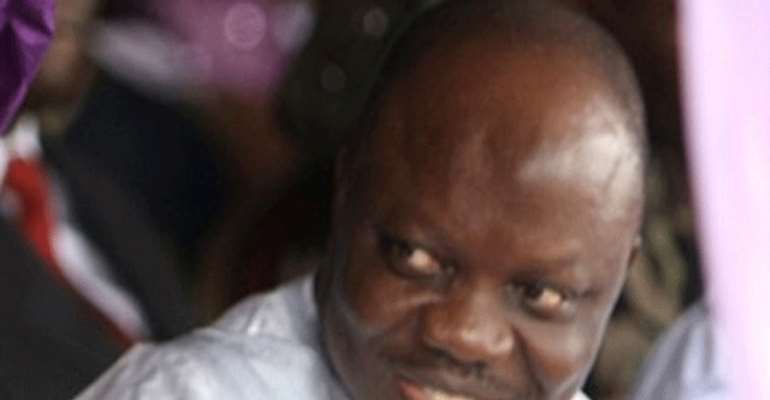Uduaghan: We'll Support Sovereign Wealth Fund But…

Governor Emmanuel Uduaghan of Delta State Friday expressed support for the Sovereign Wealth Fund and charged the federal government to ensure effective participation of all the states in the management of the initiative.
He gave the charge in Asaba during the second anniversary lecture of the fifth Assembly of the Delta State House of Assembly.
The governor explained that state governors were not against the establishment of the SWF 'per se, but the way and manner' in which it was being managed.
'We are not against the Sovereign Wealth Fund. States should be able to decide the amount to save and what to do with their savings since they are not appendages of the federal government,' he said.
The Federal Government and the 36 states have been at loggerheads over the SWF for sometime now.
The case is presently before the Supreme Court. The court has since asked the Federal Government and the state governors to explore out-of-court settlement. Only this week, 36 state finance commissioners walked out of the monthly revenue allocation meeting in Abuja over a number of issues, including deductions for the SWF.
Uduaghan also called for the immediate review of the Value Added Tax Law to enable state governments collect VAT in their locality and remit an agreed percentage to the federal government.
He explained that the idea of VAT being collected and shared to states that abhor some of the VAT items like alcohol was unacceptable.
'We collect VAT on alcohol in Delta State and the money is shared to some states in the North where alcohol is prohibited. This is not acceptable.'
The governor also advocated for the practice of true Fiscal Federalism in the country 'to enable federating states have access to their resources for maximum development.'
He stated that the practice of Fiscal Federalism would create the opportunity for states to develop their mineral and other resources and improve their revenue bases.
'This would engender healthy competition among the various states in the federation and enhance infrastructure development.
'The issue of Fiscal Federalism is dear to all state governors. If we are practicing true Fiscal Federalism in this country, the state governors will not need to go to Abuja to beg or lobby for what is rightfully theirs.'
The governor commended the Delta State House of Assembly for its contributions to the development of the state explaining that the constant dialogue between the legislative and executive arms had led to the developmental strides in the state.
Speaking further, the governor commended Deltans for the support given so far to his administration and charged politicians to be peaceful and eschew violence and acts that would heat up the polity as 2015 election activities begin.
In a welcome address, the Speaker of the Delta State House of Assembly, Victor Ochei explained that the idea of the public lecture was to deliberate and proffer solutions to topical national issues.
The speaker said that Delta State Government was promoting the 'Delta Beyond Oil' initiative to help develop other sectors of the economy explaining that taxation was one of the means being used to achieve the initiative.
Ochei said the idea of Fiscal Federalism suggested that each tier of government in a federating state would be allowed to pursue its own financial policy initiative explaining that it would ensure rapid development of the country.
In his speech, the Deputy Senate President, Ike Ekweremadu said fiscal federalism and strengthening of democratic institutions were issues that needed to be addressed 'if Nigeria is to move forward as a sovereign country.'
Ekweremadu said: 'a federating arrangement where the units converge at the federal capital every month like spoilt adults to be bottle- fed with free money without thinking of how to make their own money is what I have often described as a feeding bottle federalism. And typical of free money, this culture has had a lottery effect on the nation.
'This culture of free money has also affected our national attitude to taxation as a catalyst for socio-economic development, as the citizenry regard the allocations from the centre as a national cake. There is aloofness among them towards resources that are not accruing from and impacting their individual pockets in the form of taxes.
'The poor economic health status of most states, their poor development indices and high debt profiles are all concrete evidence that feeding bottle federalism is a huge disservice to industry, creativity, enterprise, responsible governance and national development.'
Ekweremadu explained that fiscal federalism and enhanced resource control had become a reoccurring decimal in the constitutional amendment process since 1999, 'but unfortunately, they have failed to garner the requisite support to scale through due to embedded fears which he said is unfounded.'
Deputy Speaker of the House of Representatives, Emeka Ihedioha in his lecture titled: 'Legislative Issue in Fiscal Federalism' called on the states to tap into other areas of resources to generate revenue.
'While we confront the problems facing us a nation, it's an achievement that the country has marked fourteen years of uninterrupted democracy. The challenges facing all of us is to ensure that the remaining two years left of our mandate, at all levels of government is to justify the trust of the people and provide democracy dividend.'
